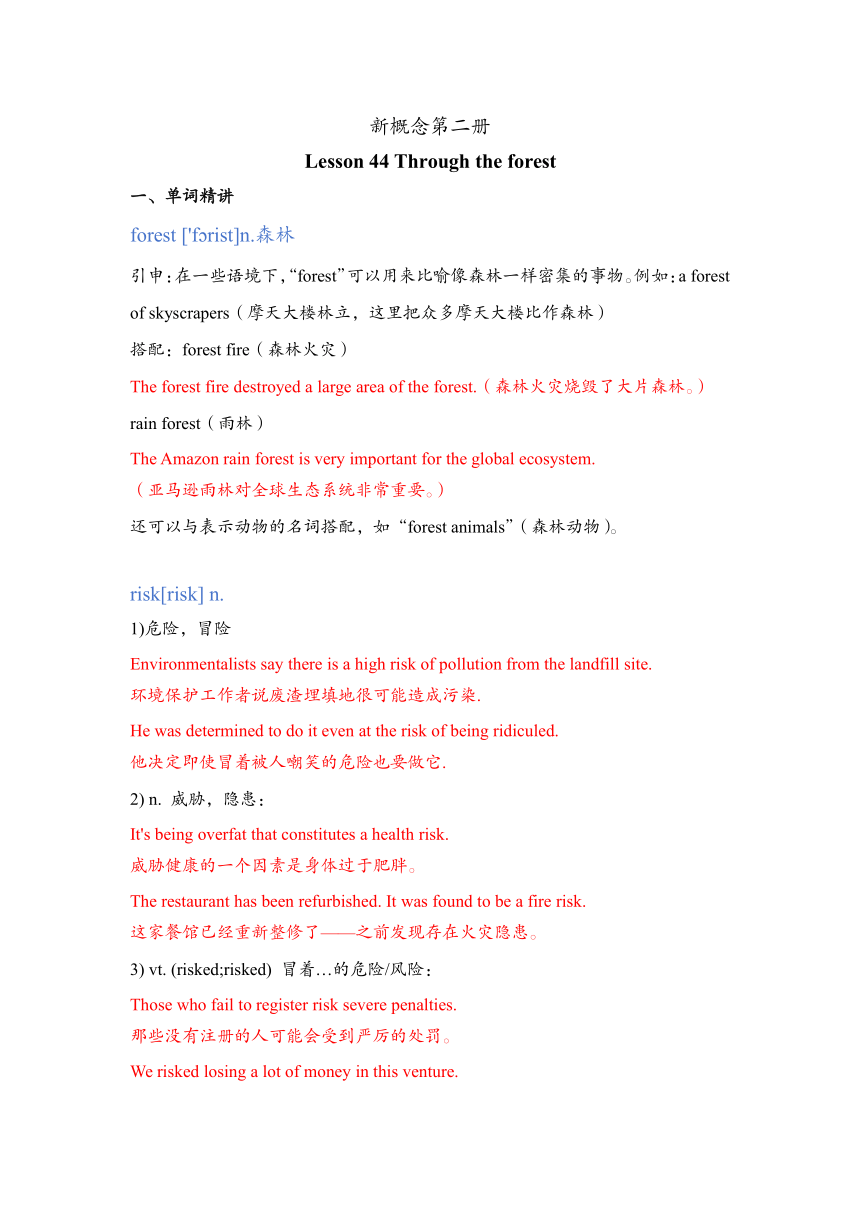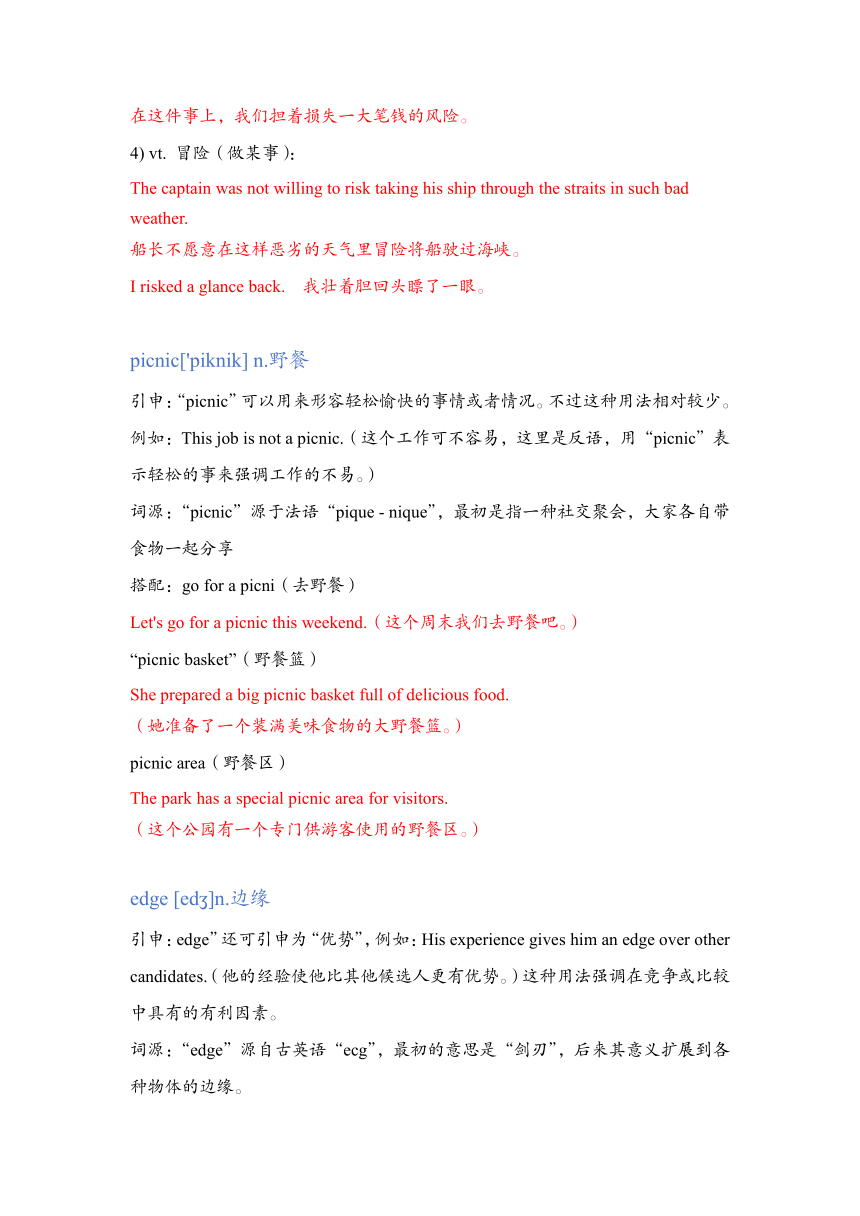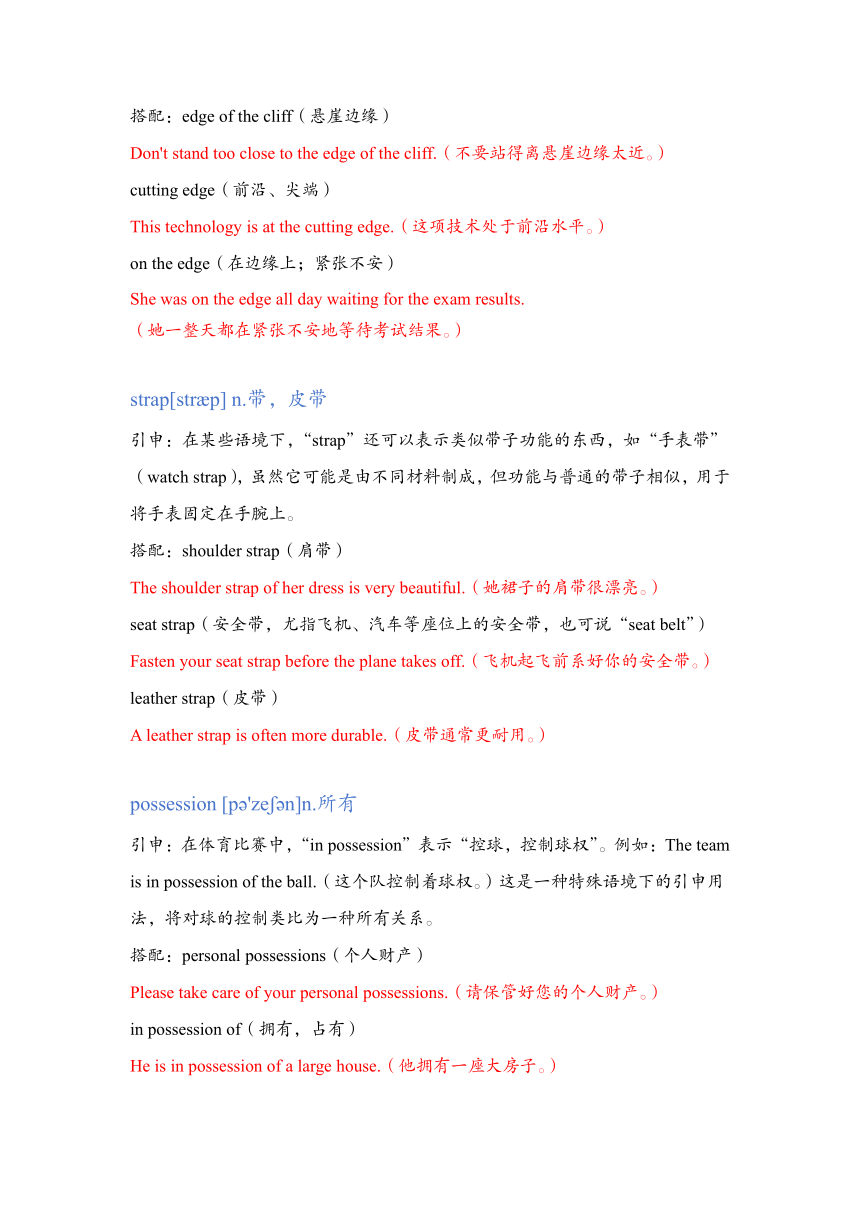新概念第二册Lesson 44 Through the forest讲义
文档属性
| 名称 | 新概念第二册Lesson 44 Through the forest讲义 |  | |
| 格式 | docx | ||
| 文件大小 | 162.5KB | ||
| 资源类型 | 教案 | ||
| 版本资源 | 新概念英语 | ||
| 科目 | 英语 | ||
| 更新时间 | 2024-11-22 11:19:47 | ||
图片预览



文档简介
新概念第二册
Lesson 44 Through the forest
单词精讲
forest ['f rist]n.森林
引申:在一些语境下,“forest”可以用来比喻像森林一样密集的事物。例如:a forest of skyscrapers(摩天大楼林立,这里把众多摩天大楼比作森林)
搭配:forest fire(森林火灾)
The forest fire destroyed a large area of the forest.(森林火灾烧毁了大片森林。)
rain forest(雨林)
The Amazon rain forest is very important for the global ecosystem.
(亚马逊雨林对全球生态系统非常重要。)
还可以与表示动物的名词搭配,如“forest animals”(森林动物)。
risk[risk] n.
1)危险,冒险
Environmentalists say there is a high risk of pollution from the landfill site.
环境保护工作者说废渣埋填地很可能造成污染.
He was determined to do it even at the risk of being ridiculed.
他决定即使冒着被人嘲笑的危险也要做它.
2) n. 威胁,隐患:
It's being overfat that constitutes a health risk.
威胁健康的一个因素是身体过于肥胖。
The restaurant has been refurbished. It was found to be a fire risk.
这家餐馆已经重新整修了——之前发现存在火灾隐患。
3) vt. (risked;risked) 冒着…的危险/风险:
Those who fail to register risk severe penalties.
那些没有注册的人可能会受到严厉的处罚。
We risked losing a lot of money in this venture.
在这件事上,我们担着损失一大笔钱的风险。
4) vt. 冒险(做某事):
The captain was not willing to risk taking his ship through the straits in such bad weather.
船长不愿意在这样恶劣的天气里冒险将船驶过海峡。
I risked a glance back. 我壮着胆回头瞟了一眼。
picnic['piknik] n.野餐
引申:“picnic”可以用来形容轻松愉快的事情或者情况。不过这种用法相对较少。例如:This job is not a picnic.(这个工作可不容易,这里是反语,用“picnic”表示轻松的事来强调工作的不易。)
词源:“picnic”源于法语“pique - nique”,最初是指一种社交聚会,大家各自带食物一起分享
搭配:go for a picni(去野餐)
Let's go for a picnic this weekend.(这个周末我们去野餐吧。)
“picnic basket”(野餐篮)
She prepared a big picnic basket full of delicious food.
(她准备了一个装满美味食物的大野餐篮。)
picnic area(野餐区)
The park has a special picnic area for visitors.
(这个公园有一个专门供游客使用的野餐区。)
edge [ed ]n.边缘
引申:edge”还可引申为“优势”,例如:His experience gives him an edge over other candidates.(他的经验使他比其他候选人更有优势。)这种用法强调在竞争或比较中具有的有利因素。
词源:“edge”源自古英语“ecg”,最初的意思是“剑刃”,后来其意义扩展到各种物体的边缘。
搭配:edge of the cliff(悬崖边缘)
Don't stand too close to the edge of the cliff.(不要站得离悬崖边缘太近。)
cutting edge(前沿、尖端)
This technology is at the cutting edge.(这项技术处于前沿水平。)
on the edge(在边缘上;紧张不安)
She was on the edge all day waiting for the exam results.
(她一整天都在紧张不安地等待考试结果。)
strap[str p] n.带,皮带
引申:在某些语境下,“strap”还可以表示类似带子功能的东西,如“手表带”(watch strap),虽然它可能是由不同材料制成,但功能与普通的带子相似,用于将手表固定在手腕上。
搭配:shoulder strap(肩带)
The shoulder strap of her dress is very beautiful.(她裙子的肩带很漂亮。)
seat strap(安全带,尤指飞机、汽车等座位上的安全带,也可说“seat belt”)
Fasten your seat strap before the plane takes off.(飞机起飞前系好你的安全带。)
leather strap(皮带)
A leather strap is often more durable.(皮带通常更耐用。)
possession [p 'ze n]n.所有
引申:在体育比赛中,“in possession”表示“控球,控制球权”。例如:The team is in possession of the ball.(这个队控制着球权。)这是一种特殊语境下的引申用法,将对球的控制类比为一种所有关系。
搭配:personal possessions(个人财产)
Please take care of your personal possessions.(请保管好您的个人财产。)
in possession of(拥有,占有)
He is in possession of a large house.(他拥有一座大房子。)
come into possession of(得到,获得)
She came into possession of a large fortune.(她得到了一大笔财富。)
breath [breθ] n.呼吸
引申义:在一些语境下,“breath”可以表示“气息”“微风”等类似的意思。例如:A cold breath of wind blew through the window.(一股冷风从窗户吹进来。)这里将风比作像呼吸一样轻柔的气流。
搭配:hold one's breath(屏住呼吸)
The audience held their breath as the acrobat walked on the tightrope.
(杂技演员走钢丝时,观众们屏住了呼吸。)
out of breath(喘不过气来)
He was out of breath after running for a long time.
(他跑了很长时间后喘不过气来。)
take one's breath away(使某人惊叹)
The beautiful scenery took our breath away.(美丽的景色使我们惊叹不已。)
contents['k :ntents]n.(常用复数)内有的物品
引申义:在计算机领域,“contents”可以表示文件、文件夹等里面的数据、信息等。
The contents of this file need to be backed up.(这个文件的内容需要备份。)
搭配:the contents of a bag(包里的东西)
She emptied the contents of her bag on the table.(她把包里的东西倒在桌子上。)
table of contents(目录)
The table of contents at the front of the book helps you find the information you need.(书前面的目录有助于你找到所需信息。)
contents page(目录页)
The contents page lists all the chapters in the book.
(目录页列出了书中的所有章节。)
mend[mend] v.修理
引申义:在一些语境下,“mend”有“改善,改正(行为、关系等)”的意思。例如:He is trying to mend his bad habits.(他正在努力改正他的坏习惯。)这里将改正坏习惯类比为对有问题的东西进行修理,使其变好。
搭配:mend a fence(修补篱笆)
He spent the whole afternoon mending the fence.(他花了整个下午修补篱笆。)
mend one's ways(改过自新,改正行为)
The naughty boy promised to mend his ways.(这个淘气的男孩答应改过自新。)
mend a broken heart(治愈受伤的心)
It takes time to mend a broken heart.(治愈一颗受伤的心需要时间。)
重点句型
动名词(2)
它可以代替名词作句子的主语、宾语、介词宾语等,也学习了它的否定式和完成式:
Washing the car made me tired.
擦洗汽车使我很累。(主语)
I enjoy reading.
我喜爱读书。(宾语)
Before leaving the office, he gave me a book.
他离开办公室之前给了我一本书。(介词宾语)
(1)动名词还可以用于动词+介词之后:
We are looking forward to his coming.我们盼望着他的到来。
(2)在start,begin, continue等后面,既可以用不定式又可以用动名词,区别不大:
I began to learn/ learning English two years ago.
我两年前开始学英语。
(3)在love,like,prefer等动词后面,用不定式和动名词意义有所区别。带不定式时常表示特定的未来的事件(如正准备做某事或建议做某事),带动名词形式时则表示目前正在进行中的活动或一般的行为。在prefer…to…结构中则只能用动名词
我喜欢看电视。(一般行为)
(4)在need,want之后,动名词形式具有被动的含义,相当于被动的不定式:
The windows need cleaning.
这些窗子该擦了。(=need to be cleaned)
His shirt needs washing.
他的衬衣该洗了。
课文精讲
Mrs. Anne Sterling did not think of the risk she was taking when she ran through a forest after two men. 安·斯特林夫人在穿过森林追赶两个男人时,她并没有考虑到所冒的风险。
(1)think of在这里表示“考虑”、“思考”。
Have you ever thought of settling down in this town
你有没有考虑过在这个镇上定居?
(2)表示“冒……危险”可以用 take the risk(of doing…)。
(3)run after 表示“追赶”:
On my way home, I saw a dog running after a cat.
我在回家的路上看到一只狗在追一只猫。
They had rushed up to her while she was having a picnic at the edge of a forest with her children…
刚才,当她和孩子们正在森林边上野餐的时侯,这两个人冲到她跟前……
(1)up to可以表示地点、时间等“一直到……”:
The child ran up to his mother when he saw her.
那孩子看到他的母亲后便跑到她跟前。
He worked up to nine o'clock in the evening.
他一直工作到晚上9点。
(2)at the edge of表示“在……的边上”:
The park lies at the edge of the town.
公园位于镇边上。
in one's possession, 为某人所有。
也可以说 in the possession of sb.。这两种意思相同,但是人称代词一般用前一种表达方式:
The house used to be in my possession, but now it is in the possession of an old lady.
这座房子曾经归我所有,但现在它归一位老太太所有。
Mrs. Sterling got so angry that she ran after them.
斯特林太太非常气愤,向着他们追了过去。
so…that引导结果状语从句,表示“如此……以至于……”。
下文中,The men got such a fright that they dropped the bag and ran away用了类似的引导结果状语从句的连词 such a…that。
out of breath,喘不上气,上气不接下气。
Tom ran to the shop to get some salt for his mother. When he reached there, he was quite out of breath.
汤姆为了给母亲买盐跑步去了商店。当他到那里时,他已很是上气不接下气。
go through,翻看。
这是个固定短语,含义之一是“(仔细地)搜查”、“在……中搜寻”:
She went through her bag, but she couldn't find her key.
她翻遍了包,但就是找不到她的钥匙。
Lesson 44 Through the forest
单词精讲
forest ['f rist]n.森林
引申:在一些语境下,“forest”可以用来比喻像森林一样密集的事物。例如:a forest of skyscrapers(摩天大楼林立,这里把众多摩天大楼比作森林)
搭配:forest fire(森林火灾)
The forest fire destroyed a large area of the forest.(森林火灾烧毁了大片森林。)
rain forest(雨林)
The Amazon rain forest is very important for the global ecosystem.
(亚马逊雨林对全球生态系统非常重要。)
还可以与表示动物的名词搭配,如“forest animals”(森林动物)。
risk[risk] n.
1)危险,冒险
Environmentalists say there is a high risk of pollution from the landfill site.
环境保护工作者说废渣埋填地很可能造成污染.
He was determined to do it even at the risk of being ridiculed.
他决定即使冒着被人嘲笑的危险也要做它.
2) n. 威胁,隐患:
It's being overfat that constitutes a health risk.
威胁健康的一个因素是身体过于肥胖。
The restaurant has been refurbished. It was found to be a fire risk.
这家餐馆已经重新整修了——之前发现存在火灾隐患。
3) vt. (risked;risked) 冒着…的危险/风险:
Those who fail to register risk severe penalties.
那些没有注册的人可能会受到严厉的处罚。
We risked losing a lot of money in this venture.
在这件事上,我们担着损失一大笔钱的风险。
4) vt. 冒险(做某事):
The captain was not willing to risk taking his ship through the straits in such bad weather.
船长不愿意在这样恶劣的天气里冒险将船驶过海峡。
I risked a glance back. 我壮着胆回头瞟了一眼。
picnic['piknik] n.野餐
引申:“picnic”可以用来形容轻松愉快的事情或者情况。不过这种用法相对较少。例如:This job is not a picnic.(这个工作可不容易,这里是反语,用“picnic”表示轻松的事来强调工作的不易。)
词源:“picnic”源于法语“pique - nique”,最初是指一种社交聚会,大家各自带食物一起分享
搭配:go for a picni(去野餐)
Let's go for a picnic this weekend.(这个周末我们去野餐吧。)
“picnic basket”(野餐篮)
She prepared a big picnic basket full of delicious food.
(她准备了一个装满美味食物的大野餐篮。)
picnic area(野餐区)
The park has a special picnic area for visitors.
(这个公园有一个专门供游客使用的野餐区。)
edge [ed ]n.边缘
引申:edge”还可引申为“优势”,例如:His experience gives him an edge over other candidates.(他的经验使他比其他候选人更有优势。)这种用法强调在竞争或比较中具有的有利因素。
词源:“edge”源自古英语“ecg”,最初的意思是“剑刃”,后来其意义扩展到各种物体的边缘。
搭配:edge of the cliff(悬崖边缘)
Don't stand too close to the edge of the cliff.(不要站得离悬崖边缘太近。)
cutting edge(前沿、尖端)
This technology is at the cutting edge.(这项技术处于前沿水平。)
on the edge(在边缘上;紧张不安)
She was on the edge all day waiting for the exam results.
(她一整天都在紧张不安地等待考试结果。)
strap[str p] n.带,皮带
引申:在某些语境下,“strap”还可以表示类似带子功能的东西,如“手表带”(watch strap),虽然它可能是由不同材料制成,但功能与普通的带子相似,用于将手表固定在手腕上。
搭配:shoulder strap(肩带)
The shoulder strap of her dress is very beautiful.(她裙子的肩带很漂亮。)
seat strap(安全带,尤指飞机、汽车等座位上的安全带,也可说“seat belt”)
Fasten your seat strap before the plane takes off.(飞机起飞前系好你的安全带。)
leather strap(皮带)
A leather strap is often more durable.(皮带通常更耐用。)
possession [p 'ze n]n.所有
引申:在体育比赛中,“in possession”表示“控球,控制球权”。例如:The team is in possession of the ball.(这个队控制着球权。)这是一种特殊语境下的引申用法,将对球的控制类比为一种所有关系。
搭配:personal possessions(个人财产)
Please take care of your personal possessions.(请保管好您的个人财产。)
in possession of(拥有,占有)
He is in possession of a large house.(他拥有一座大房子。)
come into possession of(得到,获得)
She came into possession of a large fortune.(她得到了一大笔财富。)
breath [breθ] n.呼吸
引申义:在一些语境下,“breath”可以表示“气息”“微风”等类似的意思。例如:A cold breath of wind blew through the window.(一股冷风从窗户吹进来。)这里将风比作像呼吸一样轻柔的气流。
搭配:hold one's breath(屏住呼吸)
The audience held their breath as the acrobat walked on the tightrope.
(杂技演员走钢丝时,观众们屏住了呼吸。)
out of breath(喘不过气来)
He was out of breath after running for a long time.
(他跑了很长时间后喘不过气来。)
take one's breath away(使某人惊叹)
The beautiful scenery took our breath away.(美丽的景色使我们惊叹不已。)
contents['k :ntents]n.(常用复数)内有的物品
引申义:在计算机领域,“contents”可以表示文件、文件夹等里面的数据、信息等。
The contents of this file need to be backed up.(这个文件的内容需要备份。)
搭配:the contents of a bag(包里的东西)
She emptied the contents of her bag on the table.(她把包里的东西倒在桌子上。)
table of contents(目录)
The table of contents at the front of the book helps you find the information you need.(书前面的目录有助于你找到所需信息。)
contents page(目录页)
The contents page lists all the chapters in the book.
(目录页列出了书中的所有章节。)
mend[mend] v.修理
引申义:在一些语境下,“mend”有“改善,改正(行为、关系等)”的意思。例如:He is trying to mend his bad habits.(他正在努力改正他的坏习惯。)这里将改正坏习惯类比为对有问题的东西进行修理,使其变好。
搭配:mend a fence(修补篱笆)
He spent the whole afternoon mending the fence.(他花了整个下午修补篱笆。)
mend one's ways(改过自新,改正行为)
The naughty boy promised to mend his ways.(这个淘气的男孩答应改过自新。)
mend a broken heart(治愈受伤的心)
It takes time to mend a broken heart.(治愈一颗受伤的心需要时间。)
重点句型
动名词(2)
它可以代替名词作句子的主语、宾语、介词宾语等,也学习了它的否定式和完成式:
Washing the car made me tired.
擦洗汽车使我很累。(主语)
I enjoy reading.
我喜爱读书。(宾语)
Before leaving the office, he gave me a book.
他离开办公室之前给了我一本书。(介词宾语)
(1)动名词还可以用于动词+介词之后:
We are looking forward to his coming.我们盼望着他的到来。
(2)在start,begin, continue等后面,既可以用不定式又可以用动名词,区别不大:
I began to learn/ learning English two years ago.
我两年前开始学英语。
(3)在love,like,prefer等动词后面,用不定式和动名词意义有所区别。带不定式时常表示特定的未来的事件(如正准备做某事或建议做某事),带动名词形式时则表示目前正在进行中的活动或一般的行为。在prefer…to…结构中则只能用动名词
我喜欢看电视。(一般行为)
(4)在need,want之后,动名词形式具有被动的含义,相当于被动的不定式:
The windows need cleaning.
这些窗子该擦了。(=need to be cleaned)
His shirt needs washing.
他的衬衣该洗了。
课文精讲
Mrs. Anne Sterling did not think of the risk she was taking when she ran through a forest after two men. 安·斯特林夫人在穿过森林追赶两个男人时,她并没有考虑到所冒的风险。
(1)think of在这里表示“考虑”、“思考”。
Have you ever thought of settling down in this town
你有没有考虑过在这个镇上定居?
(2)表示“冒……危险”可以用 take the risk(of doing…)。
(3)run after 表示“追赶”:
On my way home, I saw a dog running after a cat.
我在回家的路上看到一只狗在追一只猫。
They had rushed up to her while she was having a picnic at the edge of a forest with her children…
刚才,当她和孩子们正在森林边上野餐的时侯,这两个人冲到她跟前……
(1)up to可以表示地点、时间等“一直到……”:
The child ran up to his mother when he saw her.
那孩子看到他的母亲后便跑到她跟前。
He worked up to nine o'clock in the evening.
他一直工作到晚上9点。
(2)at the edge of表示“在……的边上”:
The park lies at the edge of the town.
公园位于镇边上。
in one's possession, 为某人所有。
也可以说 in the possession of sb.。这两种意思相同,但是人称代词一般用前一种表达方式:
The house used to be in my possession, but now it is in the possession of an old lady.
这座房子曾经归我所有,但现在它归一位老太太所有。
Mrs. Sterling got so angry that she ran after them.
斯特林太太非常气愤,向着他们追了过去。
so…that引导结果状语从句,表示“如此……以至于……”。
下文中,The men got such a fright that they dropped the bag and ran away用了类似的引导结果状语从句的连词 such a…that。
out of breath,喘不上气,上气不接下气。
Tom ran to the shop to get some salt for his mother. When he reached there, he was quite out of breath.
汤姆为了给母亲买盐跑步去了商店。当他到那里时,他已很是上气不接下气。
go through,翻看。
这是个固定短语,含义之一是“(仔细地)搜查”、“在……中搜寻”:
She went through her bag, but she couldn't find her key.
她翻遍了包,但就是找不到她的钥匙。
同课章节目录
